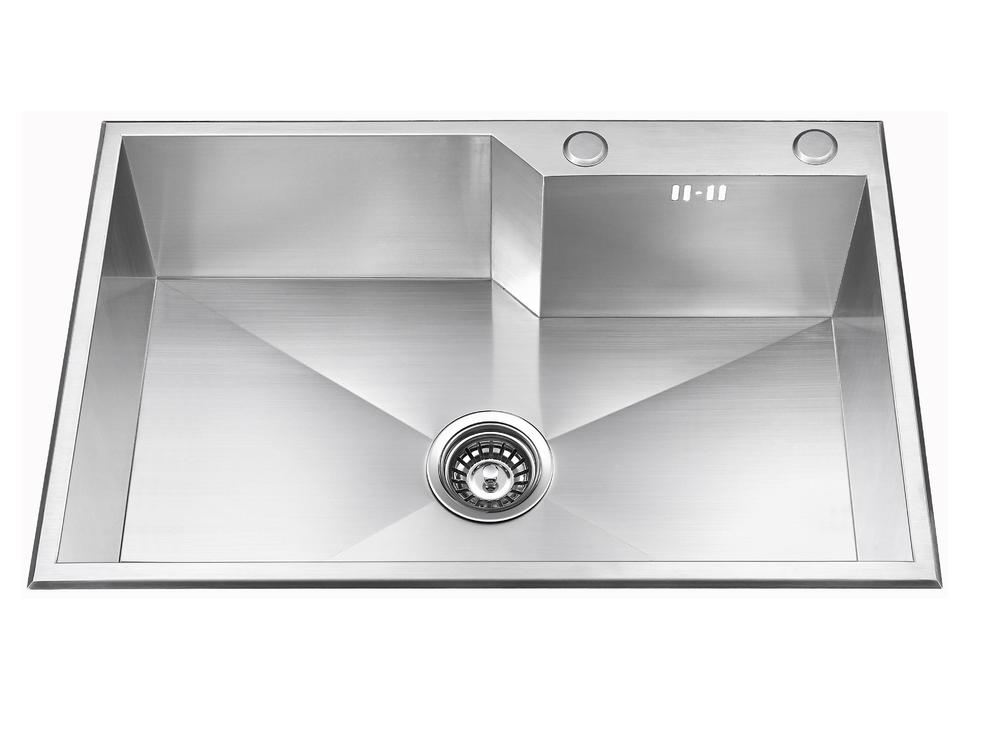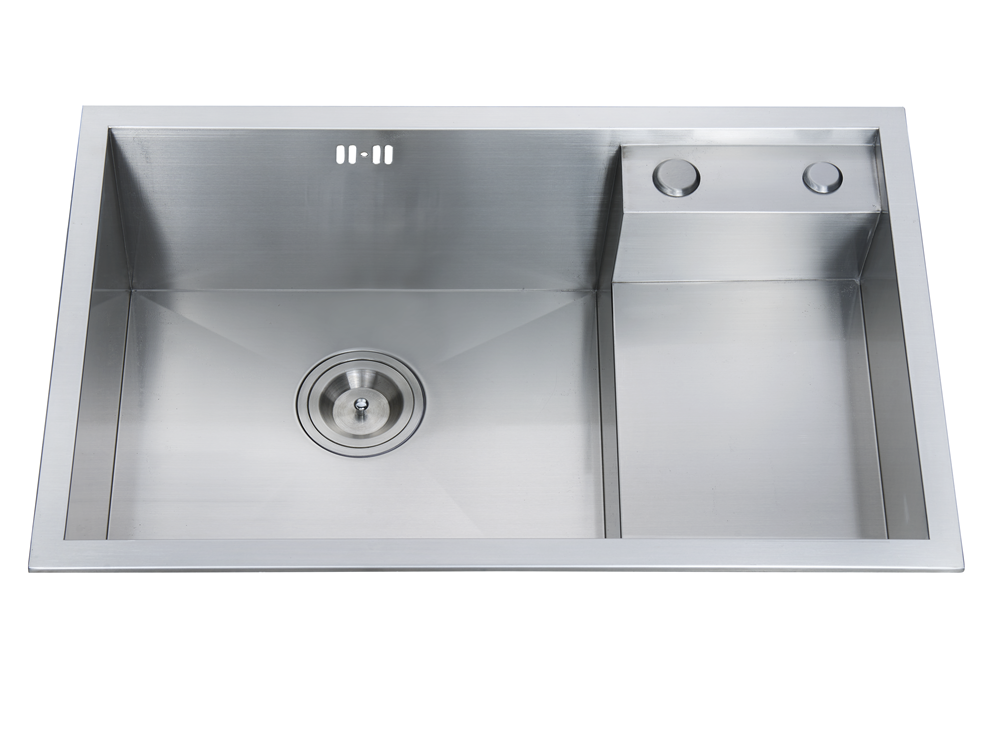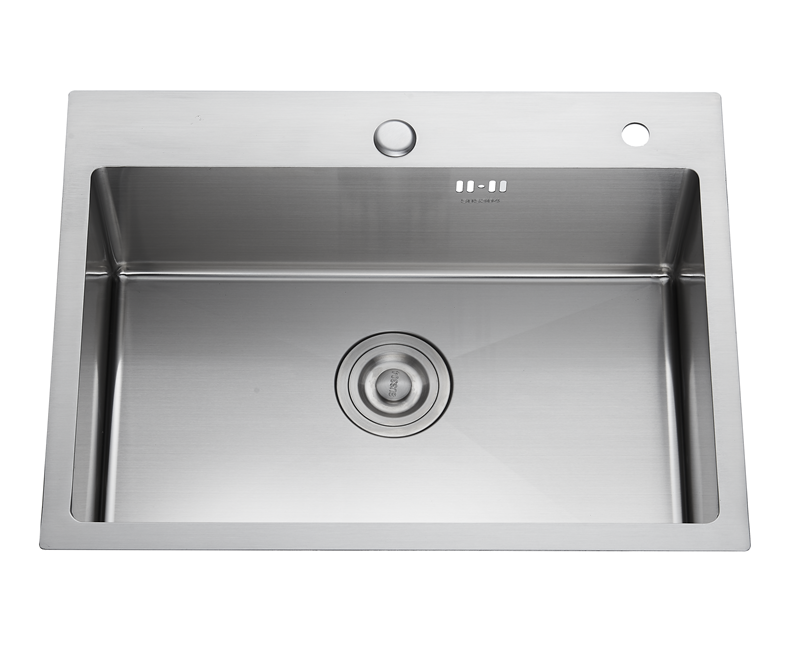
Cleaning and Maintenance Method of Single Bowl Kitchen Sink
A single bowl kitchen sink is a common fixture in many households, and it is essential to keep it clean and well-maintained to ensure its longevity and functionality.
Regular cleaning and maintenance of your kitchen sink can prevent the buildup of germs, bacteria, and other harmful substances that can compromise your health and the cleanliness of your kitchen.
Here are some tips on how to clean and maintain your kitchen basin single kitchen sink.
Daily cleaning of your single kitchen sink unit is essential to maintain its cleanliness and hygiene. After every use, rinse the sink with hot water and dish soap to remove any food debris, grease, and grime. Use a soft sponge or cloth to wipe down the sink and rinse with hot water.
Avoid using abrasive cleaners, steel wool, or scouring pads as they can scratch the sink's surface.
In addition to daily cleaning, you should perform a weekly deep cleaning of your single kitchen sink bowl. This includes removing any mineral deposits or stains that may have accumulated over time.
To do this, you can use a mixture of equal parts water and vinegar. Soak a cloth or sponge in the solution and scrub the sink's surface thoroughly. Rinse with hot water and dry with a clean cloth.
Once a month, you should clean the drain of your single bowl kitchen sink to prevent clogs and ensure proper drainage. To do this, remove any debris or food particles from the drain and pour a mixture of equal parts baking soda and vinegar down the drain. Let the solution sit for 15-30 minutes before flushing it with hot water.
If your single bowl kitchen sink has rust stains, there are a few ways to remove them. One effective method is to sprinkle some baking soda onto a damp cloth and rub it onto the affected area.
You can also mix some lemon juice and salt into a paste and apply it to the stain. Let it sit for a few minutes before scrubbing it with a brush or sponge and rinsing it with hot water.
In addition to cleaning the kitchen basin single kitchen sink itself, it's important to keep the faucet clean as well. Over time, mineral deposits and grime can accumulate on the faucet, leading to a dull appearance and reduced functionality.
To clean the faucet, mix some dish soap and warm water in a bowl and use a cloth or sponge to wipe down the surface. You can also use a toothbrush to scrub any hard-to-reach areas.
If you notice a foul odor coming from your single bowl kitchen sink, it may be due to food particles or debris that has become trapped in the drain.
Try pouring some baking soda or vinegar down the drain to prevent odors once a week. You can also use a commercial drain cleaner or snake to remove any clogs.
To maintain the appearance and functionality of your big single kitchen sink, there are a few things you can do. Avoid leaving standing water in the sink for prolonged periods, as this can cause discoloration or staining.
Additionally, avoid using abrasive cleaners, bleach, or harsh chemicals on the sink's surface, as these can damage the finish.
If your single bowl kitchen sink has a garbage disposal, it's important to maintain it properly to prevent clogs and malfunctions. Avoid putting hard or fibrous foods down the disposal, as these can damage the blades.
You can also run some ice cubes and lemon wedges through the disposal once a month to freshen it up and remove any buildup. In conclusion, cleaning and maintaining your single kitchen sink unit is essential to keep it clean, hygienic, and functional. By following these simple tips, you can ensure that your single kitchen sink unit stays clean, hygienic, and functional for many years to come.
Regular cleaning and maintenance of your kitchen sink can prevent the buildup of germs, bacteria, and other harmful substances that can compromise your health and the cleanliness of your kitchen.
Here are some tips on how to clean and maintain your kitchen basin single kitchen sink.
Daily Cleaning
Daily cleaning of your single kitchen sink unit is essential to maintain its cleanliness and hygiene. After every use, rinse the sink with hot water and dish soap to remove any food debris, grease, and grime. Use a soft sponge or cloth to wipe down the sink and rinse with hot water.
Avoid using abrasive cleaners, steel wool, or scouring pads as they can scratch the sink's surface.
Weekly Cleaning
In addition to daily cleaning, you should perform a weekly deep cleaning of your single kitchen sink bowl. This includes removing any mineral deposits or stains that may have accumulated over time.
To do this, you can use a mixture of equal parts water and vinegar. Soak a cloth or sponge in the solution and scrub the sink's surface thoroughly. Rinse with hot water and dry with a clean cloth.
Monthly Cleaning
Once a month, you should clean the drain of your single bowl kitchen sink to prevent clogs and ensure proper drainage. To do this, remove any debris or food particles from the drain and pour a mixture of equal parts baking soda and vinegar down the drain. Let the solution sit for 15-30 minutes before flushing it with hot water.
Removing Rust Stains
If your single bowl kitchen sink has rust stains, there are a few ways to remove them. One effective method is to sprinkle some baking soda onto a damp cloth and rub it onto the affected area.
You can also mix some lemon juice and salt into a paste and apply it to the stain. Let it sit for a few minutes before scrubbing it with a brush or sponge and rinsing it with hot water.
Keeping the Faucet Clean
In addition to cleaning the kitchen basin single kitchen sink itself, it's important to keep the faucet clean as well. Over time, mineral deposits and grime can accumulate on the faucet, leading to a dull appearance and reduced functionality.
To clean the faucet, mix some dish soap and warm water in a bowl and use a cloth or sponge to wipe down the surface. You can also use a toothbrush to scrub any hard-to-reach areas.
Preventing Odors
If you notice a foul odor coming from your single bowl kitchen sink, it may be due to food particles or debris that has become trapped in the drain.
Try pouring some baking soda or vinegar down the drain to prevent odors once a week. You can also use a commercial drain cleaner or snake to remove any clogs.
Daily Maintenance
To maintain the appearance and functionality of your big single kitchen sink, there are a few things you can do. Avoid leaving standing water in the sink for prolonged periods, as this can cause discoloration or staining.
Additionally, avoid using abrasive cleaners, bleach, or harsh chemicals on the sink's surface, as these can damage the finish.
Maintaining the Garbage Disposal
If your single bowl kitchen sink has a garbage disposal, it's important to maintain it properly to prevent clogs and malfunctions. Avoid putting hard or fibrous foods down the disposal, as these can damage the blades.
You can also run some ice cubes and lemon wedges through the disposal once a month to freshen it up and remove any buildup. In conclusion, cleaning and maintaining your single kitchen sink unit is essential to keep it clean, hygienic, and functional. By following these simple tips, you can ensure that your single kitchen sink unit stays clean, hygienic, and functional for many years to come.








